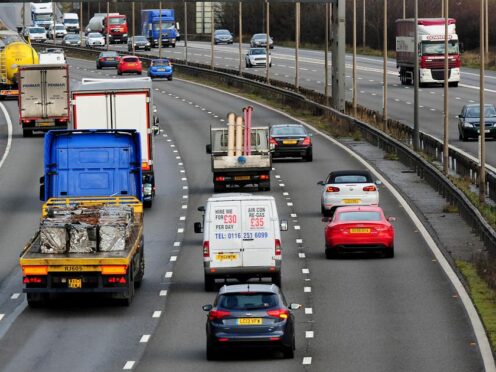Climate change experts have said they are “dubious” about whether the Scottish Government will be able to hit another key environmental target by the end of this decade.
Chris Stark, chief executive of the Climate Change Committee (CCC), warned it will be “extraordinarily difficult” for ministers to achieve the goal of reducing the number of kilometres travelled by car by 20% by 2030.
He issued the warning just days after Holyrood’s Net Zero Secretary Mairi McAllan announced the Scottish Government was abandoning its target to reduce emissions by 75% by 2030.
While Ms McAllan has pledged to publish a plan later this year setting out how the car use reduction can be achieved, Mr Stark said: “I am dubious about any plan to be successful in delivering the 20% reduction, and the reason I say that is because the requirements are pretty big to pull that off.”

Giving evidence to MSPs on Holyrood’s Net Zero Committee, Mr Stark said to hit the target the Scottish Government will need to have the same impact that was achieved in the first year after London introduced the congestion charge for every year between now and 2030.
He told MSPs: “Maybe they have a plan to do that in the Scottish Government. I would love to see it.
“But that took years of planning for London to introduce that, and we haven’t had that kind of planning in cities across Scotland.”
Adding that the more rural nature of parts of Scotland can mean people having to make longer journeys, he insisted the target for reducing car kilometres will be “an extraordinarily difficult target to hit”.
Tory net zero spokesperson Douglas Lumsden said: “This frank warning fully exposes the abject failure of the SNP-Green government to meet their previous climate change targets.
“They were repeatedly warned by the Climate Change Committee that their targets were not going to be achieved, especially when they missed annual emission targets in eight out of the last 12 years.”
The Conservative MSP added: “The SNP-Green government need to heed these warnings, stop deflecting blame elsewhere and actually deliver on their climate change promises this time.”
Meanwhile, Labour’s net zero spokesperson Sarah Boyack said: “After the catastrophic decision to scrap Scotland’s 2030 climate targets, the SNP-Green government now seems set to tear up more pledges.
“Scotland deserves better than a string of broken promises from a government more interested in setting targets than meeting them.”
The Scottish Government is failing to achieve Scotland’s ambitious climate goals. There is still no comprehensive delivery strategy for meeting future emissions targets and actions fall short. (1/5) pic.twitter.com/352XKlcX91
— Climate Change Committee (@theCCCuk) March 20, 2024
The warning on the Scottish Government target to reduce car use comes after the CCC – which advises the Scottish and UK governments on environmental issues – said in March it was “beyond credible” the target of reducing emissions by 75% by 2030 could be achieved.
Mr Stark told MSPs the CCC had “felt that the time had come for us to call that target out”.
He said: “It would require a ninefold increase in recent rates of decarbonisation in the Scottish economy if we were to hit it.
“We don’t see a policy package that could deliver anything close to that, therefore we felt it was important to say we felt the target could not be met.”
With Scotland the first part of the UK to be forced to withdraw a climate change target, he said there could be “dangerous moments” ahead.

Mr Stark praised the Scottish Government for retaining the ambition to reach net zero by 2045, but he stressed the need for action – warning “not having something to guide the short term concerns me”.
He added: “We have a 2045 net zero target in law, but we have nothing much beyond that for the next few months.
“Therefore we need to look to the strength of the policies the Scottish Government brings in the next 12 months to this Parliament as a test of how serious the Scottish Government really is now of its climate credentials.
“We must not find ourselves in this position again, because there is a credible path to net zero by 2045 that goes through ambitious target for 2030 and 2040.
“But we need to be realistic about the steps the country can take to get to that goal by 2045.”
A Scottish Government spokesperson said: “Net Zero Secretary Mairi McAllan last week announced a suite of new policies which will step up action to reduce emissions and which complement the ambitious measures already being taken forward this year, including but not limited to our Circular Economy Bill, currently at Stage 2; our work to decarbonise every home in Scotland, which we recently consulted on and which the CCC have said could be a blueprint for the UK; and in agriculture reform, as part of the Agriculture and Rural Communities Bill currently at Stage 2.
“In Transport, the Scottish Government’s route map to reduce car usage by 20% will be also published later this year. This will incentivise people to switch to electric vehicles where this is possible for them. Other measures include more than quadrupling the number of Electric Vehicle charging points by 2030 and developing an integrated ticketing system which can be used across public transport.
“Scotland already has the most comprehensive network of EV chargers per capita anywhere in the UK outside of London; we provide the most generous concessionary bus travel scheme in the UK and co-developed Low Emission Zones in four cities.
“That is not to mention our completion of the world’s largest floating offshore wind leasing round in Scotwind and the confirmation, just this week, that ministers have consented Europe’s largest offshore wind farm off the Aberdeenshire coast, to be jointly led by a local Aberdeen firm.”
